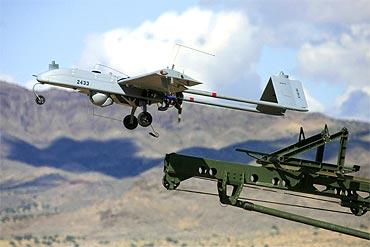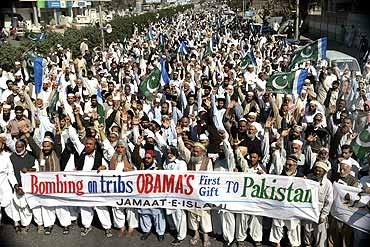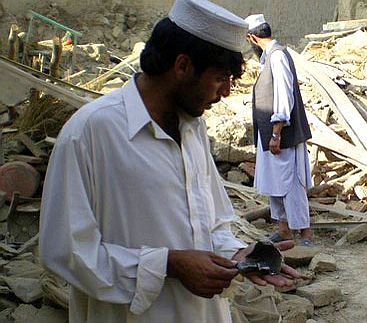Photographs: Reuters Ajai Shukla in New Delhi
Visiting United States Defence Secretary Leon Panetta on Wednesday, strongly backed America's drone campaign, which flies unmanned aerial vehicles, or drones, from Afghanistan into Pakistan's tribal areas to launch missile attacks on terrorists who feature on a detailed hit list, says Ajai Shukla
Successful Predator drone strikes have whittled Al Qaeda dramatically, through high-tech operations like last week's aerial execution of its deputy leader, Abu Yahya Al-Libi, in North Waziristan.
"The worst job you can get these days is to be a deputy leader in Al Qaeda or, for that matter, a leader," Panetta wise-cracked to North Atlantic Treaty Organisation soldiers in Kabul, where he went from New Delhi.
But opposition is growing to this new form of war. In May, Cameron Munter, America's respected ambassador in Islamabad, quit, and apparently because of his opposition to the Central Intelligence Agency's unrelenting drone campaign in the Federally Administered Tribal Areas, as the predominantly Pashtun belt along the Pak-Afghan border is called.
According to The New York Times, he bitterly told a colleague that CIA drone strikes are central to US policy in Pakistan, and that "he didn't realise his main job was to kill people".
Back in Washington, President Barack Obama is under attack from the left fringe of his own party. Democratic congressman Dennis Kucinich has launched a letter campaign that questions the legal basis for striking targets in a country that the US is not at war with.
In another stinging reproof earlier this month, the UN human rights chief, Navi Pillay, said Pakistan's prime minister should refer the legality of missile strikes to the UN's special rapporteur on extrajudicial, summary or arbitrary executions. The London-based Bureau of Investigative Journalism estimates some 850 civilians, including many women and children, have died in drone attacks in the FATA, with several hundred more injured.
...
What are the issues?
Image: Supporters of Jamat-e-Islami protest against military operations and drone attacks in tribal areasPhotographs: Athar Hussain/Reuters
Criticism of the drone campaign is of three different types. Realists argue drone strikes create mass resentment in FATA, creating 10 terrorists for each one killed. Then there are moralists, who oppose drones because of the many innocents, including women and children, who become "collateral damage".
The third lot is the idealists, who believe drone strikes are a cowardly way of fighting a war from a distance, dispensing with the responsibility and judgment that comes from proximity and immediacy.
Washington, to nobody's surprise, remains unmoved by these objections. With the US firm on withdrawing the bulk of its military from Afghanistan by 2014, drones provide an irresistible option for retaining strike power in the region, with minimum exposure to human life.
Given the satellite multi-media links the US enjoys, even the UAV ground controllers that watch real-time video feed from the drones operate from the US mainland.
Washington claims foolproof safeguards against collateral damage. President Obama personally approves the execution of each drone target. This, says the administration, has brought down to "single digits" the number of innocents killed in drone strikes over the past year. But the devil is in the details.
According to The New York Times, the formula for identifying collateral damage is skewed to produce favourable results. When a drone strike takes place, all men of military age who happen to be in the target area are assumed to be militants.
Given the success of drones in decimating Al Qaeda, the fleet is expanding even as the US military downsizes due to budgetary constraints. While the US army is being cut from the current level of 570,000 soldiers to 490,000 soldiers over the coming decade, the drone fleet will go up by a third, said the Pentagon in January.
...
On the ground
Image: Villagers pick up rocket fragments after a drone strikePhotographs: Reuters
For Pakistan's military, US drone attacks present an unresolved dilemma. On the one hand, Rawalpindi secretly welcomes the killing of jehadi leaders in drone attacks. On the other hand, unilateral drone attacks, for which the US seeks no permission from Pakistan, are humiliating violations of sovereignty.
The Pak army has suggested a compromise: placing Pakistan in charge of the drone attacks. But Washington flatly rejects that. Given the lack of trust between the two countries, any form of Pak control over America's cutting-edge drone fleet is unthinkable.
Besides, with Islamabad blocking US access to Afghanistan; clamping on CIA operations in Pakistan; refusing the use of Pak military bases; downgrading intelligence cooperation and re-evaluating the entire relationship with Washington, drone strikes remain America's only serious lever in Pakistan today.
Therefore, as Panetta made clear, drone attacks will continue in FATA, irrespective of Pak objections. That quashes any hope that an American and NATO drawdown from Afghanistan in 2014 might ease the security environment by ending the provocation of "foreign occupation".
With Pashtun resentment continuing to boil in FATA; and with radical Pakistani groups like Difa-e-Pakistan continuing to rabble rouse through accusations of "violation of sovereignty", the AfPak region seems likely to witness continued turmoil.





article